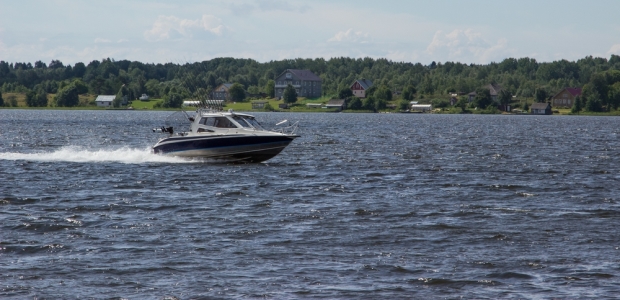
The Environmental Impacts of Boating
Several studies have identified dozens of unintentional and unexpected hazards to the environment associated with boating.
While a day on the boat might sound fun and relaxing, environmentally conscious boaters should consider what their watercraft is doing to the ecosystem around them. Perhaps unsurprisingly, several studies have identified dozens of unintentional and unexpected hazards to the environment associated with boating, which might have many reevaluating how they spend their days on the water.
On the Water
Just as soils are changed by constant tread of feet or wheels, water itself is often changed by the presence of boats. Studies on water quality and clarity found that in heavily trafficked waterways, boats did have a noticeable impact. The presence of vessels seemed to increase the growth of algae and kick up sediments, both of which obstruct sunlight and spoil the water. What's more, deposits left from boats can change the water's chemistry, adding too much of certain compounds, like zinc and copper, or making an environment overly alkaline or acidic. A decrease in water quality is bad for both wildlife and humans.
On the Wildlife
Given that boats are large, intrusive, and dangerous vehicles, it is not difficult for most boaters to understand that their vessels have negative impacts on wildlife. Most people know too well the story of the manatee, whose populations dropped drastically after motorized boats began touring their shallow habitats around Florida. Because manatees are notoriously slow-moving ― the sloths of tropical water ― they cannot avoid the exceedingly speedy watercraft, and collisions with hulls or scrapes by propellers often do fatal harm. However, propellers alone cannot take responsibility for even a small percentage of damage done to freshwater and marine wildlife.
In fact, a large amount of impairment to wildlife is caused by smaller, less noticeable aspects of boats. Chemicals used to clean, protect, and run watercraft often leach into the water, severely impacting the environment and weakening or killing the wildlife. Aquatic plants and animals have specific requirements for light, temperature, pH level, and more, and toxins from detergents, paints, petroleum products, batteries, and metals have disastrous effects on wildlife’s ability to survive and thrive, including cancer, mutations, birth defects, and outright death.
On Humans
Boating, like other motorsports, isn't utterly risk free. Boaters often face more dangers than land-based drivers, if only because there is less public education on boat safety. Boaters often operate their vessels without proper precautions, including sufficient floatation devices, restraints, or sobriety, which can lead to terrible accidents, injuries, and deaths.
However, humans should be even more concerned about the impacts of boats on natural environments. Many freshwater waterways used for recreational boating are also tapped for drinking water or used as spots for catching fish, shellfish, and other foods. Unfortunately, the toxins that endanger aquatic life are also threatening to humans; consuming contaminated water or seafood is likely to cause extensive health problems. In fact, merely swimming in heavily trafficked waterways has been known to impair health because some toxins, like tributyltin (TBT) in anti-fouling paints, can be absorbed through the skin or eyes. Even humans aren't safe from the pollution caused by boats.
Eco-Conscious Boating Tips
This information may come as a surprise to many boaters who enjoy the hobby for its contact with natural environments. Yet it is possible to continue boating without having such profound impacts on the water and wildlife.
Newer makes and models of boats tend to be more fuel-efficient and less prone to leaks and degradation that endanger underwater ecosystems, so those boaters with poorly aging watercraft might consider donating their vessels and upgrading to more sustainable boats. Additionally, boat maintenance is vital in both increasing a boat’s life span and protecting the environment. The following practices are essential:
- Have a supply of rags on board to clean up oil and fuel spills as soon as they occur.
- Dispose of used oil and filters through the proper channels. Boaters can find the closest facilities online or by calling 1-800-CLEANUP.
- Be careful with portable fuel tanks. Boaters should fill them on shore, never overfill them, and secure and close them when not in use.
- Wax often. Wax on fiberglass prevents surface dirt from building up and reduces the need for harsh detergents when washing.
- Avoid abrasive cleaning tools. Soft sponges and freshwater applied to topsides should sufficiently clean the vessel.
- Use natural and non-toxic cleaning solutions.
- Choose alternatives to anti-fouling paint. Regular paint and wax or storing the vessel on land are viable options.
Jenn French of Seek Visibility (www.seekvisibility.com, Las Vegas) is a content coordinator who assists in contributing informational and high quality articles on a variety of environmental topics. In her spare time she enjoys hiking with her dog, traveling to national and state parks, gardening, and cooking. Jenn is continually looking to share her knowledge with others and build positive relationships with publishers within the blogging community.